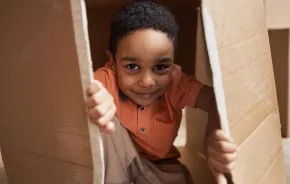
When I was pregnant with my first daughter, my midwife told me that kids love rituals. In fact, she said, they create them out of activities that you’d never imagine as being ritual-worthy.
For her family, that meant always buying socks the day after Thanksgiving. I couldn’t help but wonder what holiday magic my own family would make.
What I didn’t imagine: the pressure. Make memories that will brightly color your children’s memory banks forever! Attend holiday open houses hosted by friends and family — three in one day! Allocate hours upon hours for sprinkles and frosting! Tack up lights to match your neighbors’ efforts! See the awe-inspiring displays, near and far, at the zoo and in the city!
Take it all in until you’re up late, wrapping gifts and crying, after a day of making merry that ended in a fight.
Turns out that my midwife forgot to whisper the wisdom I really needed to hear: how to make a calm center for my family during the whirlwind holiday season. So this year, I’ve asked fellow parents how they keep their sanity between now and New Year’s.
Make your list
Our frantic holiday culture will sweep you up unless you decide what you want to do, says Meghan Leahy, a mom of three and a parenting columnist for The Washington Post.
“The way to have better holidays with your family is to really accept who you are. There are messages of more, more, more and less, less, less,” says Leahy. “If you love decorating the house and the cookies and the parties, then do it. If you hate the consumerist struggle but love the essence of the season, focus on doing that part of it.”
Jot down a quick list of what your ideal holiday includes, from events and activities to the people you actually want to see. Then, compare lists with your family, suggests Leahy. She always wants to see holiday light displays, yet her family hasn’t done this for the past few years (but, schedules permitting, hopes to this year).
“That would be on my list: the oohing and aahing and connection we feel while taking in beauty. My whole list probably won’t come to fruition, but setting and discussing intentions with my husband means one or two might happen,” says Leahy.
Know that rituals change
Kids love tradition and routine, but it’s worthwhile to ask how your family has changed, says Leahy. “Do we have to drive seven hours to Uncle Jimmy’s house and sleep on air mattresses every year? If you put your needs out there with integrity and kindness, people can feel how they are going to feel. Then you can skip one year at Uncle Jimmy’s house in favor of a new tradition,” says Leahy.
Setting boundaries to maintain your own sanity is a path worth walking, too. Parent coach Sarina Behar Natkin changed a family ritual by deciding to stay at home while her husband and two daughters visit her in-laws.
“When my youngest was 1 and my oldest was 4, I decided to never fly east during winter break again,” says Natkin. “For five days, they get time together and I get a break. Even if part of the eight days of Hanukkah happens then, we have three more days to celebrate together.”
Rituals are only good if we are meeting ourselves where we are right now, says Natkin. Kids will remember the year you played four hours of Monopoly because it was pouring rain on the day earmarked for downtown sightseeing.
Make a renewal routine
The problem with self-care is that we think of it as optional. Rather, consider it necessary and nonnegotiable for maintaining your health and well-being, says Jennifer Keeler, mom of one and owner of Yoga Momma studio in North Seattle.
“So much of being a parent is about constantly looking outside of yourself to take care of others,” Keeler says. “To access that calm, balanced space inside of ourselves, we need to be intentional about making time to nourish, rest and restore.”
Create a daily, weekly and monthly renewal routine, suggests Keeler. She believes this routine is about creating loving kindness for yourself, so it’s time best spent alone and unplugged. What that looks like is up to you: meditation, taking a walk, hiking, drawing a bath, reading a book, drinking coffee — it all counts.
“If you feel like you really don’t have the time, think about taking three deep breaths when you turn the car on and later, off. Ask how you are in this moment. Be free of judgment about your answer, accepting your own human experience,” says Keeler. “The more space we make for tuning in and nourishing ourselves, the more we can be forgiving of ourselves and our family members.”
Our kids can learn something good from this, too.
“Instead of giving in to the scarcity of energy that can happen during this season, show your kids how to prioritize health and balance by doing that yourself,” says Keeler.
Add humor
At this time of year, it goes without saying that there will be a moment (or 12) when stress wins. That’s when we can stop hating on YouTube and ask our kids to show us the videos that make them laugh.
“Anything that brings laughter necessarily releases hormones that make us feel really good,” says Leahy. “Laughing can turn moods around.”
So, google your favorite old-school “Saturday Night Live” skits and blow off some steam, for five minutes or a few hours. Laughing over hot chocolate can be a saving grace during a season that can be full of triggers, Leahy adds.
Explore expectations and feelings
When Natkin hears the word “holiday,” she thinks about the second week of winter break. Without fail, she sees a spike in calls from parents in need of support.
“It’s a temporary time with expectations of bliss while the reality is your kids are wiped from sugar overload and three late nights in a row,” says Natkin. “Have conversations and family meetings about what everyone wants to do during this season.”
If family meetings aren’t part of the regular program, add in a dinnertime conversation about the upcoming week’s overloaded schedule.
“I call family meetings and say, ‘Guys! Here’s our calendar. Is anyone feeling overwhelmed?’ I raise my hand and my 11-year-old raises her hand,” says Leahy. “Then I say, ‘Well, that’s a normal feeling.’ Sometimes we come up with solutions, but often we just acknowledge that we’re in a very busy period, so we’re going to feel stressed out.”
Leahy says this idea comes from a phrase coined by developmental psychologist Gordon Neufeld: The more space you give a feeling, the less room it takes up.
“If you’re miserable, I invite you to ask yourself right now what that misery is about,” Leahy says. “There’s a time to reframe and watch funny videos, and there’s a time to explore why we feel this way. Both will help you let yourself off the hook and be okay with feeling overwhelmed.”
Being intentional means there’s a time to decorate 50 cookies and a time to buy gorgeous store-made treats. To unwind in a bath or to laugh at the movie “Elf” together with your young — and then no-longer young — kids. To ooh and aah at the neighbor’s holiday lights next to your own home, which is sweet and unlit, full of memories, all true.











